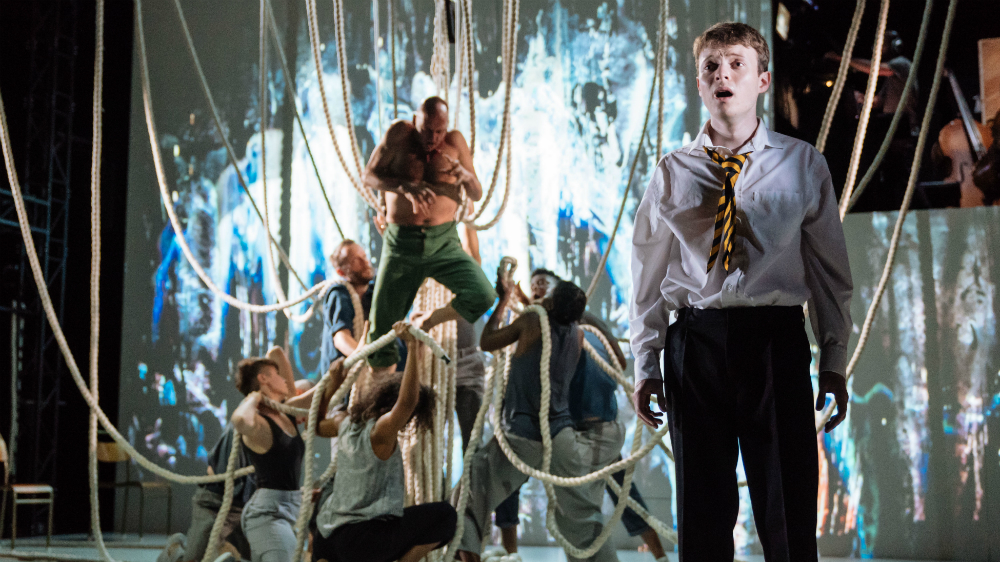London Theater Review: ‘A Monster Calls’
By Gordon Cox
LOS ANGELES (Variety.com) – “A Monster Calls” offers a child’s-eye view of cancer. Patrick Ness’ children’s novel, the winner of the 2012 Carnegie Medal and adapted into a 2016 film that starred Felicity Jones, sits with a 13-year-old boy trying to make sense of the disease laying waste to his mother — a disease that rarely, if ever, makes sense. Visited nightly by a storytelling monster, he slowly comes to appreciate that life isn’t a fairytale; it follows no plot. It’s a story about complexity that’s staged, in Sally Cookson’s Old Vic production, with the utmost simplicity.
That is, in the end, its great strength: it allows a sentimental story to cut through with sincerity. For a long while, however, it merely looks slimline: a stock gallery of school bullies, sleepless nights and scary monsters that speak in deep, echoing booms. Childhood, at first, seems the stuff of cliché: all messy bedrooms and deskbound daydreams. Cancer too: a frail woman in a headscarf heaving into a bowl, drugs that don’t work, IV drips on wheels. Slowly, all of that gets shaded in. Cookson shows there’s more to everything than might meet the eye.
On a bare white stage with ropes hanging down from the flies, Matthew Tennyson’s Connor stands looking out, blank. He breathes. A chorus looks on from the sides of the stage, leaving him isolated and alone, weighed down by the nightmares that come every night: flashing strobes, piercing cracks, juddering, physical fits. He floats through his days, half-present, as lessons drift by and bullies lay in. All Connor can think of is his mother’s condition.
Cookson captures the enormity of cancer and the way it blots everything else out. As Connor runs through his routine, individual items — blazer, cereal bowl, milk — spring into his hand, as if he can only focus on one thing at a time. The white stage makes the whole world fall away, so that only Connor and cancer seem to exist. With no-one to talk to — not the grandmother (Selina Cadell) putting on a brave, breezy face, not the father (Felix Scott) who flies in from America to offer reassurances, not the mother (Marianne Oldham) clinging to the belief that she can beat the disease — Connor bottles all his fears up. Tennyson gives a performance of eloquent restraint; hardly a flicker of emotion crosses his face, just blinking incomprehension, until it all eventually breaks.
Ness’ novel challenges the stories we tell ourselves — not only about cancer, but about the way the world works. At 12:07 each night, Stuart Goodwin’s monster, the spirit of the Yew tree outside Connor’s window, arrives to unfold fables that disrupt conventional morals: a murderous prince who scapegoats his stepmother to save his kingdom; a pastor who betrays his beliefs to save his daughters from death. Bald and barefooted, shirtless but for a bead of berries round his neck, he’s the spitting image of a Siddhartha — a wise man who sees the world as it is: no goodies, no baddies, no just deserts. Each time, he winds individual ropes up to make a tree, as if gathering strands into a single whole.
If it’s not always clear why the stories are onstage, save as a vehicle for stock theatre tricks, Cookson gradually brings time to the fore. Ness’s story is dotted with clocks — alarms in the morning, grandfather clocks in the hall. At one point, a pendulum swings across the stage, and Benji Bowers’ two-man score switches between slow, sighing strings and disjointed electro beats. Cancer, Cookson suggests, plays havoc with time. It can make days seem like decades, and two weeks to live seem like no time at all. Connor, above all, wants to hold it still, and it’s telling he pulls his grandmother’s precious clock to pieces. As the monster’s stories show us, each of us has a different sense of time — and so, of death.

